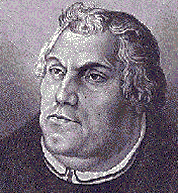
Martin Luther (1483-1546)
By his vigorous protest against certain church practices which he condemned as contrary to the Gospel, this priest and scholar from Saxony (Germany) initiated the Protestant Reformation.
Martin Luther's father (Hans) had worked in the copper mines, but rose to a position among the councillors of the little town of Mansfeld in 1491. Luther's childhood was one of sombre piety and strict discipline as was common in that age. His schooling included some time at the Latin school at Mansfeld, a year at a school in Magdeburg (run by Brethren of the Common Life) and some months at Eisenach in 1497; after this he attended the University of Erfurt, one of the best in Germany, where he matriculated in the spring of 1501 and graduated with the B.A. degree in 1502. When he took his M.A. in 1505, he had m ore than fulfilled his parents' hopes, and then embarked on legal studies. A short while later, however, without consulting his parents, the 22-year old decided to enter religious life with the Augustinian Hermits in Erfurt.
On a visit to Rome to complete his studies, the fervent young Augustinian was both impressed and appalled by what he saw at the administrative centre of the Catholic religion�a flurry of splendid building-projects, adorned with burgeoning Renaissance art, along with many symptoms of worldliness evident within the splendours of the papal court.
Luther returned to Saxony, to take up a position as a lecturer in theology at the university of Wittenberg, a position he held for most of the remainder of his life. His biblical studies soon led him to question not only the practice of churchmen, but also some of the doctrines of the Church, and most especially those regarding indulgences and jurisdiction over the granting of absolution from sin.
The idea of indulgences had been gaining ground during the later Middle Ages. Indulgences were the commutation of part of the temporal penalty due for sin, granted on the fulfilment of certain conditions, one of which might be the payment of a donation. They were granted through accredited "pardoners", (as in Chaucer's tale), and on papal authority. It was not claimed that divine forgiveness could be bought or sold, or that it was granted to those who were impenitent or unconfessed. But during the later Middle Ages, as papal financial difficulties increased, they were resorted to so often that the financial house of Fugger of Augsburg came to superintend the negotiations involved in their distribution.
Worse misunderstanding became inevitable when in 1476 Pope Sixtus IV extended the viability of Indulgences to souls in purgatory. The appeal to cupidity, the manipulation of fear, and the often outrageous statements of some indulgence sellers caused grave scandal to the truly devout. Luther had boldly preached against these abuses, although his patron, the elector Frederick had amassed a great collection of relics in the castle church at Wittenberg, to which indulgences were attached. But the immediate cause of Luther's public protest was an indulgence that Frederick had prohibited from being preached in his lands, though it was available in nearby territory. This was a jubilee indulgence, whose returns were ostensibly to finance the rebuilding of St. Peter's basilica in Rome; but by a cynical arrangement, half of the German proceeds were to go to the young Albert, archbishop of Mainz , deeply in debt owing to his rapid promotion to, and payments owed for, a number of high ecclesiastical offices.
Luther's protest at the scandalous misuse of indulgences took the form of the 95 theses, posted for public discussion, on the door of the castle church in Wittenberg. Through a series of misjudgments on the side of the ecclesiastical authorities, and of furious denunciations on Luther's own side, what might have been the occasion for some inner reform of church practices became a major schism, whose effects are with us still. For two contrasting estimates of the Reformation, see Belloc (The Great Heresies) and Schaff (History of the Christian Church)
The basis of Luther's theology was Holy Scripture; and, though the differences between his own and Augustine's thought are important, Augustine must stand next to the Bible among the influences upon his mind. The doctrines of salvation were of prime importance for him, and here the two great, many-sided complex conceptions of the Word and of faith are important. He was no systematizer, like Melanchthon or Calvin. His doctrine of Christian vocation in this world and the importance of human life in the world became part of the general Protestant inheritance. In other matters�in the room allowed for Christian liberty, in his conception of the part played by law in Christian life, and in his insistence on the Real Presence in the Eucharist�his theology differs from the patterns that emerged in the Reformed (Presbyterian) churches, in Puritanism, and in the sects such as the Anabaptists.
